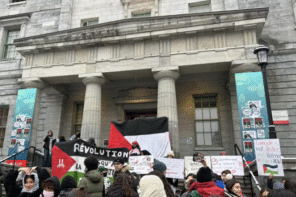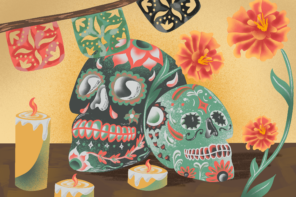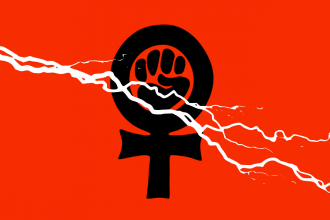In light of Arts Representative Igor Sadikov’s call via Twitter to punch Zionists, an action for which the AUS has called for his resignation, debate surrounding the contentious term has resurfaced at McGill. This is not the first time Zionism has been at the forefront of popular conversation on campus, as evidenced by the McGill Daily‘s recent decision to reject pieces that “promote a Zionist worldview.” Given that Sadikov is a former Daily News Editor, it is likely that his statement stems from their shared belief that Zionism is an oppressive movement, or as the Daily’s Editorial Board labels it: “a settler-colonial ideology that perpetuates the displacement and the oppression of the Palestinian people.”
Zionism is simply the belief that Jews should be able to live in and re-establish a national home in part of their ancestral homeland, where they can take refuge from persecution.
Indeed, many of Zionism’s critics perceive it to be a mere extension of European colonialism, framing it solely as an imperialist, exploitative ideology geared towards robbing Palestinians of their land. In many academic circles, Zionism is routinely equated with the world’s worst evils, as Sadikov’s decision to equate it with Nazism in his tweet might reflect.
But such an interpretation is intellectually weak. For Zionism is no more a dirty word than feminism. It is a movement with different interpretations and ideological bents, and as such, a homogenous “Zionist worldview” cannot be theoretically ascertained. Though its existence long predates the establishment of the State of Israel, it has become — on college campuses — an offensive term whose connotation is detached from its historical context and defined exclusively by the worst actions of the Israeli government. Given popular use of the word, people inevitably look at Israel’s occupation of the West Bank and assume it is the overarching motivation of the Zionist project, the means to the end of total annexation.
In reality, Zionism is simply the belief that Jews should be able to live in and re-establish a national home in part of their ancestral homeland, where they can take refuge from persecution, and achieve the self-determination and full national belonging that has historically been kept from them. It does not mean that Jews have a right to annex whatever territory they so choose or that they are superior to Arabs, any more than socialism means endorsing gulags, American patriotism means supporting Trump, or feminism means hating men. Yes, terrible actions have been committed in the name of Zionism, just as atrocities have been committed in the name of countless ideologies, beliefs, and nationalisms — but there is nothing uniquely intrinsic to Zionism about them.
Injustice has been committed in the name of Zionism, but one can be a Zionist without condoning Israeli state policy.
The popular and academic comparisons of Zionism to European colonialism prove weak when one examines the historical reality that Jews are a diasporic population originating from the Levant. The concept of Israel as a Jewish homeland wasn’t invented by Zionism’s founders; it has remained an integral component of Jewish identity for thousands of years. Jews, like the Druze and Yazidis, are an ethno-religious group. They do not exclusively exist as a religious entity, as their identity is also tied to ethnic affiliations rooted in the Land of Israel. This is why Jews are referred to as Semites, and why the term anti-Semitism has long been applied to bigotry and prejudice against Jews.
A simple overview of Jewish history is instructive in the contextualization of Zionism. When the Judeans were exiled from the land of Israel/Palestine through a series of expulsions at the hands of the Assyrians, Babylonians, and Romans (from 740 BCE to 70CE), they saw themselves scattered across the Middle East and Mediterranean — hence, the beginning of the Jewish diaspora. Some ended up in Central and Eastern Europe (Ashkenazi Jews), though many ended up in the Iberian Peninsula (Sephardic Jews, though many were subsequently expelled from Spain and Portugal in the 15th century and ended up in North Africa and throughout the Ottoman Empire). Many, however, had already been persistently living in the Middle East for over 2,000 years — ever since the Babylonian expulsion — and over half of the Israeli Jewish population is made up of the descendants of these Mizrahi Jews, as well as those who settled in Arab lands following the Spanish expulsion. “European colonialists”, indeed.
Decrying a diasporic people’s return to their homeland as a white colonial imposition fails to recognize the legitimate origination and attachment Jews have towards the Levant.
Despite being scattered across the globe, the diaspora retained a poignant sense of attachment to its homeland, with the primacy of the Land of Israel long looming large in the collective Jewish consciousness. Perhaps the most potent manifestation of this was the persistent use of Hebrew, the native language of the Judeans, as a lingua franca among Jews throughout millennia in the diaspora. Ashkenazi Jews in Eastern Europe spoke Yiddish, a Germanic language written with Hebrew characters, and similarly, many Jews in North Africa spoke Judeo-Arabic, a dialect of Arabic written in Hebrew. In terms of religion, the Jewish longing for a return to Israel and Jerusalem was professed through daily prayers and holiday observances. One such example is the ritual of completing the Passover Seder with the phrase, “L’shanah haba’ah b’Yerushalayim” (Next year in Jerusalem).
So while Zionism as an explicit political movement saw its inception in the 19th century, the Jewish yearning to return to the Land of Israel dates as far back as Jews have been living in the diaspora. To this end, decrying a diasporic people’s return to their homeland as a white colonial imposition fails stunningly to recognize the legitimate origination and attachment Jews have towards the Levant — not even mentioning the palpable otherness with which Europe in particular has historically treated its Jews. Nor does it acknowledge the second and third class ‘citizenship’ Mizrahi Jews were ascribed under Arab rule, and the fact that most of these same Arab Jews fled their lands under duress in the 1950s, leaving them stateless with nowhere but Israel to go. The vast majority of modern Israel is descendant from refugees from Europe, the Arab world, or both.
Far-right adherents of Zionism deserve a share of the blame for the corruption of the term.
Detractors of Zionism point to oppressive policies of the Israeli state as evidence that Zionism is innately evil. But there is nothing innate to Zionism about them. Injustice has been committed in the name of Zionism, but one can be a Zionist without condoning Israeli state policy. The one is not inherent to the other, and there is a whole world of left-wing Zionism in Israel and among progressive Jews worldwide that vehemently rejects the occupation and condemns the state’s abuses against Palestinians — while nevertheless retaining a connection to the land that constitutes a central aspect of the Jewish cultural imagination.
To be sure, far-right adherents of Zionism deserve a share of the blame for the corruption of the term. Embracing a Revisionist, messianic interpretation of Zionism, right-wing/religious nationalist hardliners have furthered their exclusive, expansionist vision of Zionism – often relying on race-baiting to do so – by claiming their extreme views to be the only “true” interpretation. These groups often deride Jews that are critical of Israeli state policy as ‘self-hating’ traitors, no better than kapos or Nazis; many far-right Zionists in fact do a distinct disservice to the Zionist project in purporting to be its only real adherents — much in the same way that many jihadists do a disservice to Islam by framing themselves as its only true followers.
For many individuals, it is their self-conception as Zionists that serves as the motivation for their boycott of goods from West Bank settlements.
Indeed, hardline Israeli government officials like Prime Minister Binyamin Netanyahu and Education Minister Naftali Bennet (leader of the religious-Zionist “Jewish Home” party) adhere to far-right Zionism, a stream that necessitates territorial expansion and invalidates Palestinian peoplehood and autonomy. The same characterization cannot be made of Israeli opposition figures like Knesset members Zehava Gal-On or Stav Shaffir, leftist Zionists who oppose the occupation and support restorative justice for Palestinians. For many individuals, it is their very self-conception as Zionists that motivates them to boycott goods from West Bank settlements. One such example is columnist Peter Beinart, who sees Israel’s occupation of the West Bank as eroding the goals of the Zionist movement — namely, a Jewish and democratic state. The same goes for Professors Steven Levitsky and Glen Weyl, who argue that their support for the Boycott, Divestment, and Sanctions Movement (BDS) is out of concern for the long-term future of the state. When both groups self-identify as Zionist, it is manifestly disingenuous to wholly accept the description by the former and not the latter.
Perhaps it is easy for individuals to smear Zionists because they believe that Zionism as an ideology stands apart from, or even in opposition to, Jewish identity. Many activists claim that their actions are directed not towards Jews, but simply towards Zionists, as if these two groups are mutually exclusive. They tokenize fringe Jewish groups such as the Neturei Karta and Independent Jewish Voices to represent what “good Jews” believe in and how “good Jews” should behave. While McGill certainly has its fair share of Jews espousing anti-Zionist views, as is their right, it is in fact expressly not their right to speak for all Jews when they announce that they themselves reject the Jewish connection to Israel. The reality is that out of the 15 million Jews in the world, almost 6.5 million of them live in Israel, and the majority of the other 8.5 million support Israel’s existence and have family and friends who live there. It is unfair to deny their connection to the land that plays such an integral role in their religion, culture, heritage, and national consciousness.
Yes, Zionism can be perceived as oppressive and dangerous even when divorced from Israeli state policy, but to others, it represents a movement of liberation and self-determination. In reality, Zionism is inherently no better or worse than other forms of nationalism. And like any nationalism, movement, or philosophy, there should be a separation of an ideology from its theoretical and material works. By banning all Zionist viewpoints outright, and failing to distinguish between the various nuanced positions that reside under the ‘Zionist’ umbrella, actions like those of the McGill Daily and Sadikov end up isolating important allies in the fight for two states. Furthermore, when these actions are done in tandem with claiming that Jewish ancestral, religious and cultural links to the Land of Israel are in any way “contested,” they become not only alienating, but demonstrable propagations of falsehoods. “Alternative facts” are not what is needed here, and excluding a group, based on a reduced understanding of a diverse ideological movement — from a conversation it is rather impacted by — is reckless, and reflects a delegitimizing agenda.









This is probably the most reasonable thing I’ve read during this entire SSMU drama. I 100% agree – both sides of the debate need to badly educate themselves. Zionism =/= Semitism (and is most certainly not a “neo-Nazi code word for Jew” as I read on one discussion board), and not all Zionists are supportive of the radical right Israeli foreign policy at the moment.
Thank you so much for writing this article. It is refreshing and encouraging to read an article from a McGill publication that does not feel like it is attacking my community.
Don’t try to reason with SSMU. You know better. About the only argument that works is based on the fact that you wouldn’t have smoked meat without Jews.
Thanks for recognizing that, you’re absolutely right.
Parts of my family in fact descend from the very Jews you mention I overlooked.
In writing the article, I mainly sought to account for the Middle Eastern origins of European Jews, both Ashkenazi and Sephardic (since they’re, for the most part, the ones ascribed the colonialist label), but you’re right that it can definitely come across to those unfamiliar with Jewish history as if there were no Jews remaining in the Middle East post-exile.
I will work on working in the oversight.
Totally agree with everything that is said here… the radically different definitions of Zionism between Zionist and non-Zionist groups is the source of most problems in discourse and prevents productive dialogue.
My only criticism is that this misses out the Jews who were exiled to and remained in Babylon for over 2000 years, spreading across the region with the biggest community centered in Iraq. In exile, Jews weren’t only scattered across the Mediterranean, ending up in Europe and later North Africa. Some of the largest and most important Jewish communities never left the Middle East.
Half of Israel’s population is made up of Mizrahim (including both the Middle East and North Africa)… so whatever you say about European settlers, how can anyone deny that these Jews, who were eventually driven out of Arab lands, are not indigenous to the region?